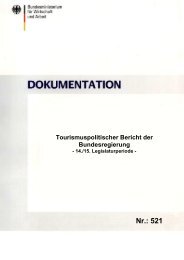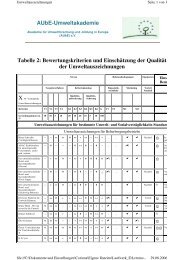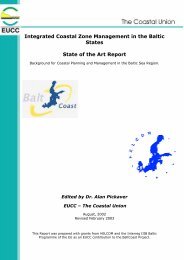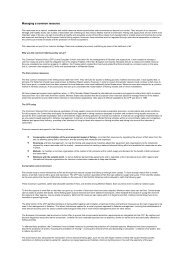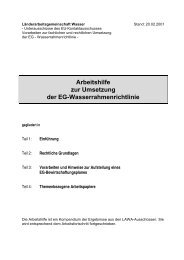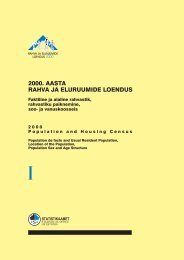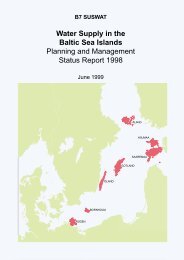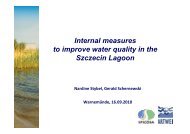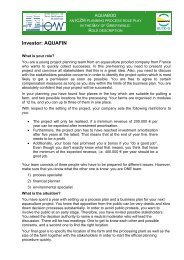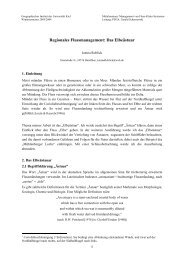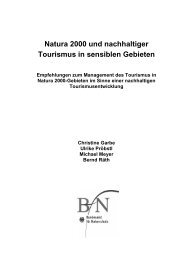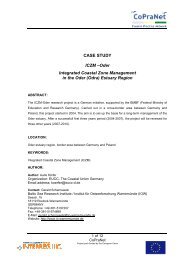The European environment - State and outlook ... - IKZM-D Lernen
The European environment - State and outlook ... - IKZM-D Lernen
The European environment - State and outlook ... - IKZM-D Lernen
Create successful ePaper yourself
Turn your PDF publications into a flip-book with our unique Google optimized e-Paper software.
Introduction<br />
Executive summary<br />
<strong>European</strong> improvements, local<br />
choices, global impacts<br />
<strong>European</strong>s value their <strong>environment</strong> — Eurobarometer<br />
polls show that a large majority (over 70 %)<br />
want decision-makers to give equal weight to<br />
<strong>environment</strong>al, economic <strong>and</strong> social policies. As<br />
individuals, <strong>European</strong>s are prepared to take some<br />
<strong>environment</strong>al action, though they would do more if<br />
they had better information on <strong>environment</strong>al choices<br />
that cost little or nothing. <strong>The</strong>y would also do more<br />
if they felt confident that their fellow citizens were<br />
doing the same.<br />
Over the past 30 years, much has been done to<br />
improve Europe's <strong>environment</strong>. Lead has been<br />
eliminated from most petrol. Ozone depleting<br />
chlorofluorocarbons (CFCs) have been phased out.<br />
Nitrogen oxide emissions from road transport have<br />
been reduced by around 90 % compared to what they<br />
would have been had catalytic converters not been<br />
introduced.<br />
Increasing treatment of urban wastewater is allowing<br />
Europe's rivers, lakes <strong>and</strong> estuaries to recover from<br />
pollution. Designation of protected natural areas in<br />
the <strong>European</strong> Union now amounts to 18 % of all the<br />
territory, helping to maintain ecosystems <strong>and</strong> preserve<br />
biological diversity. Forests are slightly increasing <strong>and</strong><br />
in some regions are regenerating at a faster rate than<br />
before. <strong>The</strong>se <strong>and</strong> many other advances translate into<br />
benefits for people's health <strong>and</strong> for their quality of life.<br />
But major challenges remain for the future. <strong>The</strong><br />
most pressing is climate change whose impacts are<br />
already thought to be evident in ever more frequent<br />
extreme weather events, regional water shortages<br />
<strong>and</strong> melting polar ice. Other <strong>environment</strong>al priorities<br />
are: air pollution <strong>and</strong> regulation of chemicals so as to<br />
reduce impacts on health <strong>and</strong> on the <strong>environment</strong>; the<br />
preservation of l<strong>and</strong> as a productive resource <strong>and</strong> as a<br />
reservoir for biodiversity; improving the quality <strong>and</strong><br />
quantity of freshwater; <strong>and</strong> ensuring the health of the<br />
oceans. Oceans, in particular, are key ecosystems that<br />
sustain many of the ecological goods <strong>and</strong> services on<br />
which we depend.<br />
Answers to some of these challenges can be found in<br />
increased use of renewable energy resources such as<br />
wind <strong>and</strong> solar power to replace some of the finite nonrenewable<br />
resources that both developed <strong>and</strong> emerging<br />
economies are competing to exploit.<br />
Many of the <strong>environment</strong>al problems we currently<br />
face are rooted in the way Europe uses its l<strong>and</strong>, <strong>and</strong><br />
in its economic structure <strong>and</strong> our ways of life. <strong>The</strong>se<br />
are difficult to change. Most notably, there has been<br />
a shift in <strong>environment</strong>al emphasis from production<br />
to consumption issues. Better awareness about<br />
<strong>environment</strong>al <strong>and</strong> health effects would positively<br />
impact our daily choices on what to buy, where to live<br />
<strong>and</strong> work, <strong>and</strong> where <strong>and</strong> how to travel.<br />
Household expenditure increased by a third in the<br />
EU-15 between 1990 <strong>and</strong> 2002. It is projected to double<br />
across the EU-25 by 2030, with major differences<br />
between income groups <strong>and</strong> regions. In an increasingly<br />
globalised economy, consumer choices everywhere<br />
increasingly impact not just Europe's <strong>environment</strong><br />
but also many other parts of the world. Better<br />
underst<strong>and</strong>ing of potential impacts through keener<br />
research is needed to help reverse some of the current<br />
<strong>and</strong> future downward trends.<br />
At around five 'global hectares' per person, the<br />
'ecological footprint' of the EU-25 — the estimated l<strong>and</strong><br />
area required to produce the resources we consume <strong>and</strong><br />
to absorb the wastes we generate — is approximately<br />
half that of the United <strong>State</strong>s, but bigger than that of<br />
Japan. It is more than double the average for countries<br />
like Brazil, China or India. Already, the total global use<br />
of natural resources is some 20 % higher than the rate<br />
of replacement each year. This has been called, 'living<br />
off the capital rather than off the interest'.<br />
Increasing urbanisation,<br />
ab<strong>and</strong>oning l<strong>and</strong><br />
Almost three-quarters of Europe's population live in<br />
urban <strong>and</strong> suburban areas which account for some<br />
10 percent of the total EU l<strong>and</strong> area. This seems<br />
manageable, yet the intensity <strong>and</strong> conflicts over the<br />
16<br />
<strong>The</strong> <strong>European</strong> <strong>environment</strong> | <strong>State</strong> <strong>and</strong> <strong>outlook</strong> 2005



